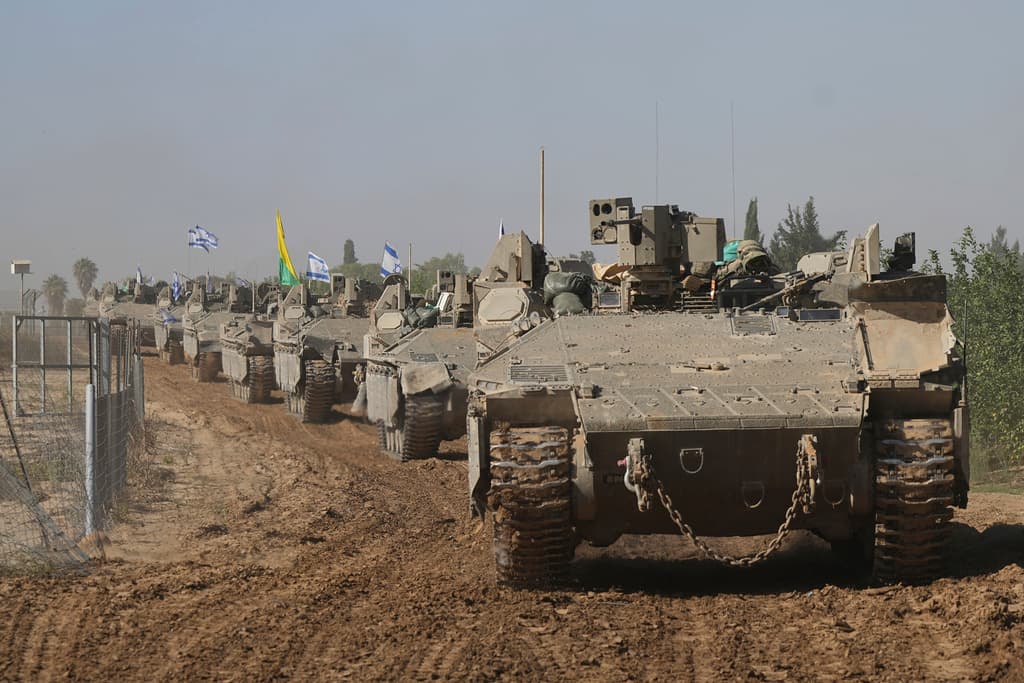Emotions, Amid a Tense Temporary Ceasefire, Are Running High as Enemy Releases 13 Israeli and 12 Thai Hostages
Freeing of the first hostages is unfolding in a way consistent with the agreement for a temporary ceasefire but amid anguish of families of hostages remaining in Hamas’s hands.

UPDATED AT 1:22 P.M. EDT
A heavy and harrowing several weeks for Israelis just became somewhat lighter — for some — as hostage transfers begin in a deal with Hamas brokered by, in Qatar, one of its financiers and watched on the internet in real time from the Rafah crossing into Egypt.
The terrorist organization has now released the first of these hostages. According to Israeli press reports and security officials, 13 Israeli hostages — women and children — were freed Friday afternoon as the terrorists handed them over to the International Red Cross.
The handover took place in a hospital at Khan Yunis in the southern part of the Gaza Strip. The hostages were on their way to the Rafah border crossing into Egypt. They were then to be handed over to the Israeli army. On the Egyptian side of the border, personnel of Israel’s internal security service, the Shin Bet, were also waiting for the newly released captives.
In addition, 12 people of Thai origin were released shortly before. Thailand’s prime minister, Srettha Thavisin, confirmed the release on X.
Hamas itself did not initially confirm the release of the Thai hostages, and there was initially no comment from the Red Cross. Egyptian press reports, though, confirmed the news and an Israeli official confirmed that the Thai captives left Gaza and were en route to a hospital in Israel. The Thai hostages were not among those who are part of an agreement between Israel and Hamas.
The two warring parties, Israel and the Hamas terrorist organization that runs the Gaza Strip, had agreed to exchange Israeli hostages in return for the release of Palestinian Arab prisoners from Israeli prisons, where they, in most cases, were held after being found guilty of crimes.
The total number of such prisoners Israel was due to release today is 39 — 24 women and 15 teenagers who have been serving prison sentences in Israel. Some of those have been convicted of attempted murder for attacks on Israeli forces. Israel is set to release 150 Palestinians under the deal of which the first elements were unfolding on Friday.
The deal also includes a ceasefire in the densely populated Gaza Strip. This has been in effect since 7 a.m. on Friday, Jerusalem time. Hamas’s boss, Ismail Haniyeh, who lives a life of luxury in Qatar, confirmed in a televised interview on Friday that the terrorist group would adhere to the ceasefire as long as Israel also adheres to it.
There were no reports of fighting after the truce began. The International Committee of the Red Cross is supposed to receive the hostages individually or in groups, take them across the border into Egypt, and hand them over to the Israeli armed forces. Their identities are then to be verified, and they will also receive medical examinations.
Once across the border they were to be allowed to make phone calls to their families, with trauma professionals present. The released Israelis will then be taken to hospitals where they will be reunited with their relatives.
Israel was expected today to receive the next list of hostages who are scheduled to be freed on Saturday. Today’s dramatic events will bring relief to dozens whose relatives have been held captive by Hamas since the October 7 attacks in southern Israel.
With most hostages still in terrorists’ hands, only a fraction of families will be reunited under the current arrangement. There is some hope that the agreement could be expanded: Israel has said it will extend the truce one day for every 10 hostages freed. Many families are expected to be left to endure the torment of not knowing the fate of their loved ones.
The plight of the hostages — who include men, women, babies, children, and older adults — has gripped Israelis. The captives’ families, to free their loved ones, have embarked on a campaign that has tugged at the heartstrings of many and ratcheted up pressure on the Israeli government to make concessions and secure deals for their release.
That pressure and the families’ widespread public support could force the government into extending the ceasefire even though it has pledged to keep fighting once the current truce expires. On Friday, Israel’s defense minister, Yoav Gallant, said that at the conclusion of what he called “a short pause,” fighting will resume “with great might and will generate pressure for the return of more hostages.”
It was confirmed on Friday evening that two elderly women, Adina Moshe and Margalit Mozes, were the first Israeli hostages to be released by Hamas.
Meanwhile, at a packed solidarity rally for hostages’ families held in front of Tel Aviv’s museum of art on Friday, a war cabinet minister, Benny Gantz, told the crowd, “I want to assure the families of all the hostages: We will not stop, we will resume the efforts and the military action in Gaza to retrieve the hostages and restore deterrence.”

